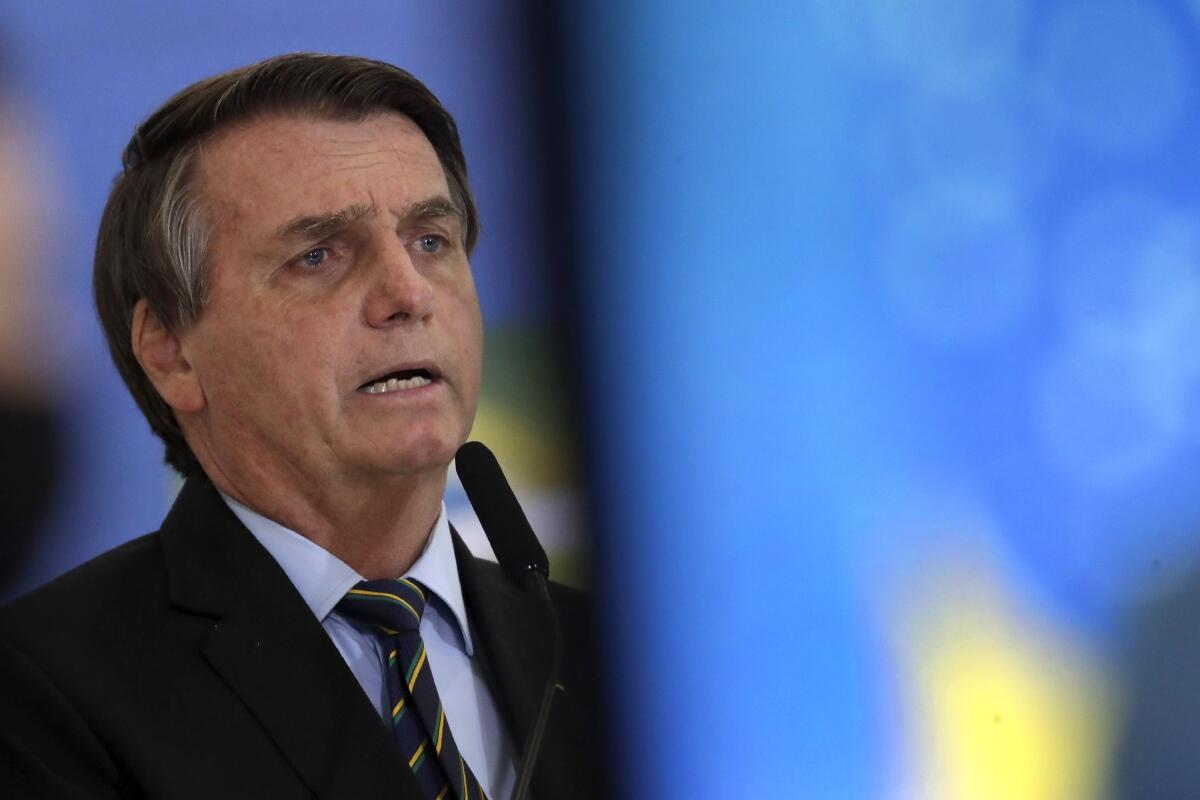As Bolsonaro moves to bolster support, Brazil armed forces leaders quit

- Share via
RIO DE JANEIRO — The leaders of all three branches of Brazil’s armed forces jointly resigned Tuesday following President Jair Bolsonaro’s replacement of the defense minister, causing widespread apprehension of a military shakeup to serve the president’s political interests.
The Defense Ministry reported the resignations — apparently unprecedented since at least the end of military rule 36 years ago — in a statement, providing no explanation for the departures. Replacements were not named. But analysts expressed fears that the president, increasingly under pressure, was moving to assert greater control over the military.
“Since 1985, we haven’t had news of such clear intervention of the president with regard to the armed forces,” said Carlos Melo, a political science professor at Insper University in Sao Paulo.
Bolsonaro, a conservative former army captain who has often praised Brazil’s former period of military dictatorship, has relied heavily on current and former soldiers to staff key Cabinet positions since taking office in January 2019, but Melo said the military itself had so far refrained from politics.
“Will this resistance continue?” he said. “That’s the question.”
The announcement came after the heads of the army, navy and air force met with the new defense minister, Gen. Walter Souza Braga Netto, on Tuesday morning.
Bolsonaro on Monday carried out a shakeup of top Cabinet positions that was initially seen as a response to demands for a course correction by lawmakers, diplomats and economists, particularly over his handling of the pandemic, which has caused more than 300,000 deaths in Brazil.
That included the replacement of Defense Minister Fernando Azevedo e Silva, who said in his resignation letter that he had “preserved the armed forces as state institutions,” a nod at his effort to keep generals out of politics.
Bolsonaro has often bristled at the checks and balances imposed by other branches of government and has attended protests targeting the Supreme Court and Congress.
He has also criticized the Supreme Court for upholding local governments’ rights to adopt pandemic restrictions that he adamantly opposes, arguing that the economic effects are worse than the disease itself.
His recent slide in popularity, and the sudden likelihood that he will face leftist former President Luiz Inácio Lula da Silva in the 2022 presidential election, has analysts saying he’s looking to the armed forces for support.
Retired Gen. Carlos Alberto Santos Cruz, who previously served as Bolsonaro’s government secretary, appeared to refer to such concerns when he responded to early rumors of military resignations with a tweet saying, “THE ARMED FORCES WON’T GO ON AN ADVENTURE.”
Since Brazil’s return to democracy in 1985, the armed forces have tried to keep a distance from partisan political quarrels.
“The government has to give explanations to the population about the change in the Defense Ministry,” Gen. Santos Cruz added.
Earlier this month, Bolsonaro began mentioning the armed forces in connection with his dispute with state governors and mayors over restrictive measures meant to slow the spread of the coronavirus in Latin America’s largest nation.
“My army doesn’t go to the street to force people to stay at home,” Bolsonaro told reporters on March 19. There are fresh concerns he could deploy soldiers to override such restrictions.
Thomas Traumann, an independent political analyst, told the Associated Press that it was the first time in living memory that all leaders of the armed forces had quit simultaneously.
“He wants people who will do whatever he wants, and so it is extremely risky,” Traumann said. “He can put the army out to allow people to go to work. So the army would be in his hands, and not in the hands of the generals.”
Bolsonaro saw his popularity rise last year, thanks to a generous pandemic welfare aid program. That popularity has dropped since the program ended in December, and there have been renewed protests against him as the nation’s daily death toll has surged to the highest in the world.
Further clouding the outlook for Bolsonaro is the reemergence of former President Da Silva after a Supreme Court justice annulled two corruption convictions and restored his political rights. Early polls show he would be a formidable challenger in next year’s election.
Critics of Bolsonaro say they fear he might echo former U.S. President Trump by questioning an election loss — but taking stronger measures to resist it.
Bolsonaro also replaced Foreign Minister Ernesto Araújo, who was accused by some of impeding the supply of vaccines by making comments seen as insulting to the Chinese and by not aggressively seeking sources.
Bolsonaro also named a new justice and public security minister and a new government secretary.
Earlier this month, Bolsonaro also replaced his health minister, active-duty army Gen. Eduardo Pazuello, the third health minister to leave office since the beginning of the pandemic. Pazuello, whose tenure coincided with most of Brazil’s 314,000 COVID-19 deaths, was investigated by the Supreme Court for alleged neglect that contributed to the collapse of the healthcare system in Amazonas state this year.
Bolsonaro also tapped a retired army general to take over state-run oil behemoth Petrobras, seeking to appeal to supportive truck drivers who had threatened to strike over fuel price increases.
Meantime, the pace of vaccination has been slow, and the political turmoil is driving people’s attention away from daily record highs in new coronavirus cases, Melo said.
With an average of some 2,400 deaths each day, Brazil accounts for a quarter of daily COVID-19 fatalities worldwide, according to Johns Hopkins University data.
More to Read
Sign up for Essential California
The most important California stories and recommendations in your inbox every morning.
You may occasionally receive promotional content from the Los Angeles Times.










